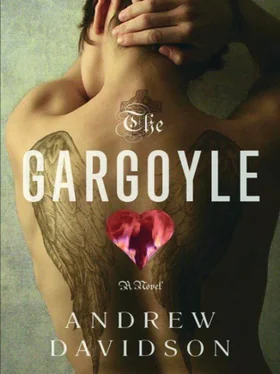Francesco would never be known as “the finest sword maker in all of Italy” or “the great metal worker of Firenze,” but this didn’t matter to him. He wanted to be a good tradesman, a dependable blacksmith with honest prices, but his real desire was to be a great husband. He crafted beautiful gifts for Graziana in his metal shop-candleholders, cutlery, and the most wondrous jewelry. He always claimed that his greatest achievements as a metal worker were the wedding rings that he had forged for himself and Graziana. In one room of their home, there was a collection of metal toys for the baby they were attempting to conceive. He dreamed of the day that he would be the loving father to her children.
He was no great beauty, this Francesco Corsellini, but then again neither was his wife. He was a little too hairy for some women, and his steely arms extended from a body built on too much pasta and beer. Graziana would call him L’Orsacchiotto-The Bear-and poke his stomach, and Francesco would respond, “I have earned this. It is relaxed muscle!”
Graziana had thick hair and dark eyes but the rest of her was undistinguished. Still, when Francesco told her she was the most beautiful woman in all of Italy, he believed it. They had been childhood sweethearts and there was rarely a day that he did not thank God for having her as his wife.
They were happy. She was kind. He was devoted. Need more be said?
Unfortunately, yes.
The year was 1347 and a new disease had just arrived from China, the most horrible disease that anyone had ever seen. It swept outward from the ports, into the cities and the Italian countryside, killing people as a forest fire destroys trees. In towns, church bells rang incessantly because it was believed the sound would drive out the illness. Many people thought that the smell of the dead carried the disease, so they walked about with scented handkerchiefs over their faces. Incense burned everywhere, mingling with the stench of death…
And one day, Graziana felt a fever in the afternoon. She retired to her bedroom for a nap. When she woke up that evening, she discovered a boil the size of an egg in her groin, and swelling under her armpits. She knew that the Black Death was upon her.
In the kitchen, Francesco was preparing food. She yelled at him to leave, immediately, because she had the illness. “Gavoccioli!” she yelled. Buboes. She demanded that he save himself, because everyone knew that there was no cure, no hope. She implored, “Leave! Leave now!”
There was a stillness in the kitchen. Graziana lay in her bed, listening to the silence that covered the distance between her and her husband. Then she heard him begin to clank the pots and pans to cover the sound of his crying. This continued for some minutes; then Francesco’s footsteps came down the hall towards her. She yelled and cursed and insisted that he stay away, but he appeared in the doorway with a tray of pasta and some wine.
“You will feel better if you eat, even just a little,” Francesco said. He entered the room, put the tray down, and sat beside her. And then he moved to kiss her.
Graziana tried to pull away. It was the first and only time in her life she attempted to refuse him but Francesco used his blacksmith’s strength to force himself upon her and kissed all her protests back into her mouth. After a few seconds, she realized it was useless to fight and she accepted him. It was done.
They ate a little that night and lay down. Through the window, the full moon looked in on them. “La luna и tenera,” Francesco said. The moon is tender. He closed his eyes and held her tighter. The last thing Graziana saw that night was his sleeping face. When she awoke the next morning, his face was the first thing she saw in the new day. She had a terrible fever, a sheen of sweat upon her, and a galloping pulse.
“Look,” he said gently, “the dark spots have come to your skin.” Graziana began to weep, but Francesco smiled and stroked her hair. “Don’t cry. We don’t have time for tears. Let us love while we still can.”
That very afternoon, Graziana fell into the worst of it. For three days, they lay together. For three days, Graziana went about dying horrendously in his arms while he told her stories about swans and miracles and great loves. On the third midnight of her illness, Francesco awoke to her tortured breathing. She turned her face to his.
“This is it.”
He said, “I will see you soon.”
Francesco kissed Graziana one final time, taking her final breath deep into his chest. “Ti amo,” she said. I love you.
After she passed, Francesco slipped the wedding ring from her finger. He, too, was now deeply ill, but he pulled himself out of bed. He could barely stand, crippled by the nausea and fever, but he forced himself into his blacksmith shop. There was one thing left to do.
He lit the fire and heated the forge. He melted both wedding rings, his and hers, and poured them into an arrowhead mold. When the arrowhead was completed, he set it onto a shaft. He looked down the length of the arrow, ensuring it was as straight and true as any he had ever made.
Francesco pulled down the crossbow that was pinned to his wall. It had belonged to his father, a great archer who had been killed in battle when Francesco and his brother Bernardo were still babies. This crossbow, which had been returned to Firenze by a fellow warrior, was the only possession of his father’s that Francesco had owned. Beyond this one thing, he did not even have memories of the man.
He returned to the bedroom, to Graziana’s body. He reached through the open window and placed the arrow and the crossbow outside. It was now dawn and he called out to a passing boy, so that he could send a message to his brother who lived in another part of town. Within the hour, Bernardo was standing outside the bedroom window.
Francesco implored his brother to come no closer, for fear that he’d pass on the disease. Francesco asked one final favor.
“Anything,” Bernardo said. “I will honor your final request.”
After Francesco made his appeal, he sat on the bed, facing the window. Between heaving sobs, Bernardo lifted the crossbow and put the arrow into place. He took a deep breath, braced his body, and asked the spirit of his father to guide the arrow to its target. Bernardo released the string and let the arrow fly. The shot was precise and death was instant.
Francesco fell backwards into the bed, beside his Graziana, with the arrowhead made of their wedding rings lodged solidly in his heart. He died as he lived, in love.
No one will ever accuse me of being overly romantic, because after Marianne Engel finished telling the story the first thing I said was “Don’t you find it depressing that they both died from the plague?”
I leave to your imagination the tone of her voice when she said that no, she did not find this story of love “depressing.”
After she left, I examined the story from a number of different angles. It was quixotic: old Italy, sacrifice, devotion, and wedding rings shot clean through the Heart of the Soul’s True Husband. Intellectually, I came to the conclusion that the point of the story probably wasn’t that the pair died from a hideous illness but that there was something poignant in Francesco’s gestures. Nevertheless, if it were I in the kitchen making noodles and my wife started shrieking about her elephantine boils, I’d be out the back door before you could say Jack Robinson.
· · ·
I waited a few days for Marianne Engel to return, anxious to report that upon reflection I had decided Francesco was not a complete moron. I wanted to show her that I was growing as a person, as they say in clichйd psychojargon, because she needed to be kept abreast of these developments. When she didn’t come, I wondered whether she had been called into the service of the gargoyles or whether I had blown it with my unromantic comments. And then my walnut-sized brain started working again: Blown what? How could I have allowed myself, even for a moment, to imagine us a couple? IDIOT.
Читать дальше











